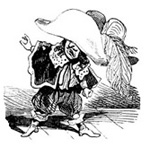
Betraying the Fort
BIDEN & BOEHNER AT NOTRE DAME
This past spring, several Catholic universities awarded honorary degrees or gave special awards to persons of doubtful Catholic bona fides. The University of Notre Dame, for example, bestowed its highest honor, the Laetare Medal, on Vice President Joseph Biden and former Speaker of the House John Boehner. University President Rev. John Jenkins, C.S.C., wished to honor these presumed paragons of civil discourse for, as he phrased it, putting “the good of the nation above partisan victory” and doing so with “respectful dialogue” and “honorable compromise.”
During springtime at Notre Dame, segments of the campus can be breathtakingly beautiful. In fact, it has often seemed to me that Notre Dame is a university held together by the grounds crew. Higher purposes float about variously, but the lakes, the basilica, the quads, the grotto, and the approaches to the university all bespeak inspiration. Except for the patina of ages that glazed everything, the Oxford of Evelyn Waugh’s generation celebrated in Brideshead Revisited could hardly have been more enchanting. Yet, at Notre Dame, an air of uncertainty, of a corporate split-personality, hangs awkwardly about.
+++
It is perhaps fruitless for amateurs, and dangerous for professionals, to try to psychoanalyze public leaders such as Fr. Jenkins for the sake of eliciting motives. But the actions they take, and their predictable consequences, are open to public scrutiny. The anger at what would be seen by some as the inappropriateness of the awardees was readily foreseeable, accentuating divisions in and beyond the Catholic community, and further alienating various constituents of the university (including a significant segment of the episcopate). Simple scandal — a “stone for stumbling” — was manifest for many who would celebrate the integrity of the university and the Church in less contorted ways than those necessarily set before them by the public awards.
Certainly, “respectful dialogue” is a good thing, particularly in troublous times, and ought to be celebrated in some fashion. But “respectful dialogue” is not self-evidently a good thing that trumps other good things in the particular circumstances surrounding the university’s awarding the Laetare Medal, particularly when one of the awardees has a record of civic schizophrenia (e.g., “personally opposed to…but publicly supporting” various legal measures that inevitably carry the most serious moral consequences for society). In precisely what substantive hierarchical order does this decision find its warrant?
You May Also Enjoy
In modern-day America, human life is destroyed on a massive scale with the cruel, evil, and machine-like efficiency characteristic of the Nazis.
We need to re-think children — whose they are, why they exist, and whether anything else we can possibly choose is more important.
As children we sang, “Sticks and stones may break my bones but names will never…

